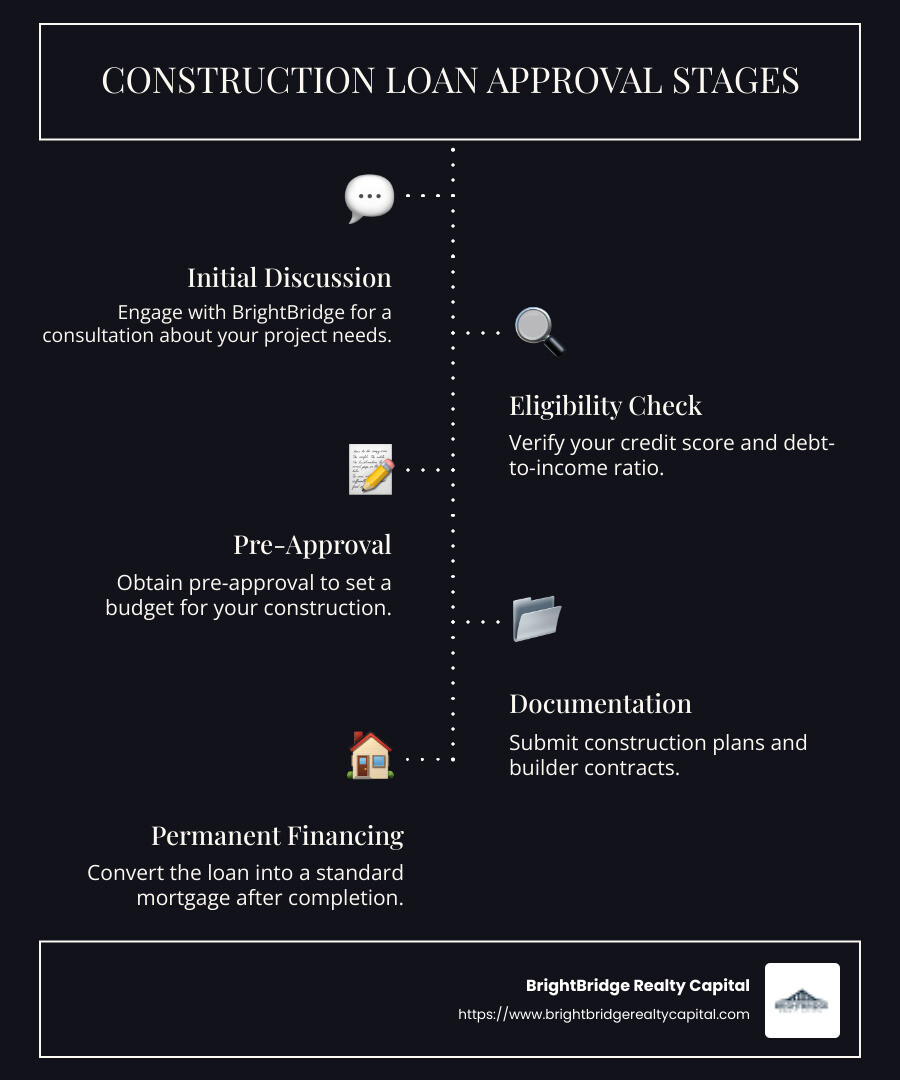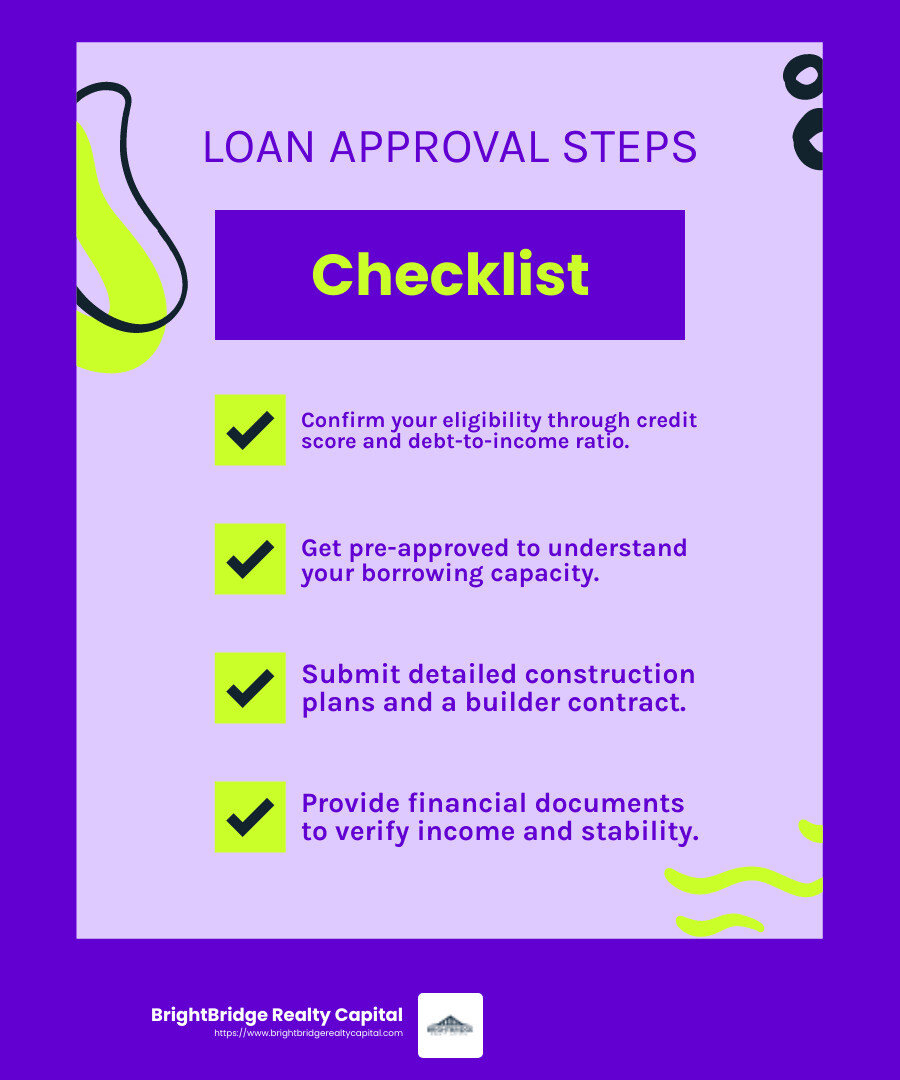From Plans to Permits: Understanding Construction Loan Approvals

Construction loan approval can be the key to bringing your architectural dreams to life. Yet, many find the journey confounding. Let's cut through the confusion. Here’s what you need to know right off the bat:
Understanding Construction Loans: These are short-term, interest-only loans used to fund the building of a residential property.
Incremental Disbursement: Funds are distributed in stages, aligning with construction progress.
Transition to Permanent Financing: Once construction is complete, the loan typically converts to a standard mortgage.
Starting on a construction project shouldn’t be stressful. At BrightBridge Realty Capital, we’re here to steer you calmly through each step.
When approaching a construction loan, envision it as a series of manageable stages rather than a looming financial hurdle. The entire process—from the initial discussion to closing—takes careful coordination. Each phase is clearly mapped, ensuring your journey is both transparent and efficient. We've streamlined our process to help you focus on your build rather than the bureaucracy.
📝 Explore how this framework efficiently lays the path to your new home's doorstep.

Simple Construction loan approval word guide:
Key Steps in Construction Loan Approval
Securing a construction loan approval involves several key steps. Understanding these steps can make the process smoother and less intimidating. Let's break it down:
Confirm Your Eligibility
Before anything else, check your eligibility for a construction loan. This involves assessing your financial health and understanding the specific requirements of different loan programs.
Special Programs: Some government-backed programs, like FHA and VA loans, offer specific advantages. These can include lower down payments and more flexible credit requirements. If you're eligible, these programs can be a great option.
Credit Score: Most lenders require a minimum credit score of 680. However, FHA loans may be accessible with a score as low as 500, depending on other financial factors.
Debt-to-Income Ratio: Lenders will examine your debt-to-income ratio to ensure you can manage additional debt. A lower ratio indicates better financial health and increases your chances of approval.
Get Pre-Approved
Pre-approval is a crucial step in the construction loan process. It gives you a clear picture of how much you can borrow, helping you avoid planning for a home you can't afford.
Creditworthiness: During pre-approval, lenders assess your credit score, income, and outstanding debts. This helps determine your borrowing capacity and interest rates.
Budgeting: Knowing your pre-approved amount allows you to plan your project within a realistic budget, avoiding unnecessary financial strain.
Submit Necessary Paperwork
Once pre-approved, you'll need to gather and submit various documents. This paperwork is essential for finalizing your loan.
Construction Plans: Detailed architectural drawings and floor plans are necessary. They provide a comprehensive overview of your project, ensuring lenders understand the scope and cost.
Builder Contract: A signed contract with your builder is required. This should include project timelines, costs, and the builder's credentials. Lenders need assurance that your builder is licensed and capable of completing the project.
Financial Documentation: Similar to a traditional mortgage, you'll need to provide financial documents like pay stubs, tax returns, and bank statements. These documents help verify your income and financial stability.

Navigating the path to construction loan approval can be complex, but understanding these key steps simplifies the journey. With the right preparation, you'll be well on your way to turning your dream home into a reality.
Next up, we'll explore the different types of construction loans available, helping you choose the best fit for your project.
Types of Construction Loans
When it comes to building or renovating a home, understanding the types of construction loans available is crucial. Let's explore the three main types: Construction-Only Loans, Construction-to-Permanent Loans, and Renovation Loans.
Construction-Only Loans
Construction-Only Loans are short-term loans designed to cover the costs of building a home. These loans typically last for about a year, just enough time to complete the construction. Once the home is built, the loan amount becomes due. Borrowers often refinance into a traditional mortgage to pay off this loan.
Key Features:
- Short-Term Financing: Ideal for those who plan to refinance or pay off the loan quickly.
- Higher Interest Rates: Due to the short-term nature and risk involved, interest rates can be higher than traditional mortgages.
- Two Closings Required: You'll need to close on both the construction loan and the subsequent mortgage, which can lead to higher costs.
Construction-to-Permanent Loans
Construction-to-Permanent Loans offer a seamless transition from construction to homeownership. This type of loan initially covers the cost of construction and then converts into a permanent mortgage once the home is built.
Key Features:
- One-Time Closing: You only need to close once, saving on closing costs and reducing paperwork.
- Automatic Conversion: Once construction is complete, the loan automatically converts to a traditional mortgage.
- Interest-Only Payments During Construction: During the building phase, you only pay interest on the amount drawn.
Renovation Loans
Renovation Loans are designed for homeowners looking to make significant improvements to an existing property. Whether you're planning to add a new room or renovate the kitchen, these loans can help finance your project.
Key Features:
- Home Improvements and Rehabilitation: Perfect for projects that improve the value and functionality of your home.
- FHA 203(k) Loans: A popular type of renovation loan, insured by the FHA, allowing for both purchase and renovation costs to be rolled into one.
- Flexible Use: Funds can be used for a variety of improvements, from structural changes to cosmetic updates.

Choosing the right type of construction loan depends on your specific needs and financial situation. Whether you're building from scratch, transitioning to a permanent mortgage, or upgrading your current home, there's a loan option to fit your plans.
Next, we'll dig into the factors that can affect your construction loan approval, such as credit score, down payment, and appraisal requirements.
Factors Affecting Construction Loan Approval
When you're set on building your dream home, understanding what affects construction loan approval is key. Let's break down the main factors: credit score, down payment, and appraisal and inspection.
Credit Score Requirements
Your credit score is a big deal when it comes to getting a construction loan. Most lenders look for a minimum credit score of 680. This number shows lenders that you're likely to pay back the loan. If your score is lower, don't worry. Some lenders might still work with you, but you might face higher interest rates.
- Conventional Loans: Typically require a higher credit score compared to government-backed loans.
- BrightBridge Realty Capital: Offers flexibility, sometimes accepting scores as low as 620, especially if other factors are strong.
Down Payment Considerations
A sizable down payment is often needed for construction loans. Most lenders ask for at least 20% of the total loan amount. This down payment acts as a security for the lender, showing that you're committed to the project.
- Loan Security: A larger down payment reduces the lender's risk, which can lead to better loan terms.
- Land as Down Payment: If you already own the land, it might count toward your down payment, reducing the cash you need upfront.
Appraisal and Inspection
Before a lender approves your loan, they want to know the property's value. This is where appraisal and inspection come in. An appraiser will look at your construction plans, the land, and the potential value of the finished home.
- Property Value: Ensures the completed home will be worth the loan amount.
- Construction Progress: Lenders may release funds in stages, based on progress inspections. This makes sure the project is on track and within budget.
Understanding these factors will help you prepare better for the loan process. Next, we'll tackle some frequently asked questions about construction loan approval.
Frequently Asked Questions about Construction Loan Approval
What is the minimum credit score required?
To secure a construction loan, having a solid credit score is crucial. Most lenders look for a minimum score of 680. This score reassures them of your ability to repay the loan. However, BrightBridge Realty Capital offers some flexibility, sometimes accepting scores as low as 620 if other factors, like your financial stability, are strong.
How long does the approval process take?
The timeline for construction loan approval can vary, but it typically takes between 30 to 60 days. Several factors can affect this timeline:
- Appraisal Timelines: Delays in getting your property appraised can extend the process.
- Underwriting Queues: Busy periods may slow down the approval as lenders process applications.
Being prepared with all necessary documents can help streamline the process and avoid unnecessary delays.
Can I get a construction loan with no money down?
While most construction loans require a down payment of at least 20%, there are exceptions. Some special programs might offer options with little to no money down, particularly for eligible borrowers:
- FHA Loans: These government-backed loans may offer lower down payment options.
- VA Loans: Available to veterans and active-duty service members, often with no down payment required.
Eligibility for these programs depends on various factors, including your credit score and financial history. It's worth exploring these options if upfront cash is a concern.
Understanding these FAQs can help clarify the path to your construction loan. Next, we'll explore the different types of construction loans available.
Conclusion
Navigating construction loans can be complex, but with the right partner, it becomes much more manageable. BrightBridge Realty Capital stands out in the industry by providing customized financing solutions custom to meet the unique needs of each client. We understand that every construction project is different, and we pride ourselves on offering flexible funding options to support your real estate ambitions.
One of our key strengths is our ability to provide fast closings. We know that time is of the essence in real estate, and waiting weeks or months for loan approval can hinder your project. That's why we streamline our processes to ensure you can secure funding quickly, often closing deals within just one week. This speed not only helps you seize opportunities as they arise but also keeps your project on track without unnecessary delays.
Moreover, our direct lending approach cuts out intermediaries, allowing us to offer competitive rates that are hard to beat. This means you get the financial support you need at a cost that makes sense for your project.
Whether you're building from the ground up, renovating, or expanding your real estate portfolio, BrightBridge Realty Capital is here to support you every step of the way. Our commitment to providing personalized service and efficient funding solutions ensures that your construction loan experience is as smooth and stress-free as possible.
Ready to take the next step? Explore our customized financing options and see how we can help turn your real estate plans into reality.


